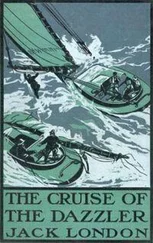Jack London - The Night-born
Здесь есть возможность читать онлайн «Jack London - The Night-born» — ознакомительный отрывок электронной книги совершенно бесплатно, а после прочтения отрывка купить полную версию. В некоторых случаях можно слушать аудио, скачать через торрент в формате fb2 и присутствует краткое содержание. Жанр: Классическая проза, на английском языке. Описание произведения, (предисловие) а так же отзывы посетителей доступны на портале библиотеки ЛибКат.
- Название:The Night-born
- Автор:
- Жанр:
- Год:неизвестен
- ISBN:нет данных
- Рейтинг книги:4 / 5. Голосов: 1
-
Избранное:Добавить в избранное
- Отзывы:
-
Ваша оценка:
- 80
- 1
- 2
- 3
- 4
- 5
The Night-born: краткое содержание, описание и аннотация
Предлагаем к чтению аннотацию, описание, краткое содержание или предисловие (зависит от того, что написал сам автор книги «The Night-born»). Если вы не нашли необходимую информацию о книге — напишите в комментариях, мы постараемся отыскать её.
The Night-born — читать онлайн ознакомительный отрывок
Ниже представлен текст книги, разбитый по страницам. Система сохранения места последней прочитанной страницы, позволяет с удобством читать онлайн бесплатно книгу «The Night-born», без необходимости каждый раз заново искать на чём Вы остановились. Поставьте закладку, и сможете в любой момент перейти на страницу, на которой закончили чтение.
Интервал:
Закладка:
"You'd better shake and make up," the Prosecuting Attorney repeated, and this time there was almost a threat in his voice.
The trials of both men were set for a week later, on the same morning, in Police Judge Witberg's court.
"You have no chance," Watson was told by an old friend of his boyhood, the retired manager of the biggest paper in the city. "Everybody knows you were beaten up by this man. His reputation is most unsavory. But it won't help you in the least. Both cases will be dismissed. This will be because you are you. Any ordinary man would be convicted."
"But I do not understand," objected the perplexed sociologist. "Without warning I was attacked by this man; and badly beaten. I did not strike a blow. I—"
"That has nothing to do with it," the other cut him off.
"Then what is there that has anything to do with it?"
"I'll tell you. You are now up against the local police and political machine. Who are you? You are not even a legal resident in this town. You live up in the country. You haven't a vote of your own here. Much less do you swing any votes. This dive proprietor swings a string of votes in his precincts—a mighty long string."
"Do you mean to tell me that this Judge Witberg will violate the sacredness of his office and oath by letting this brute off?" Watson demanded.
"Watch him," was the grim reply. "Oh, he'll do it nicely enough. He will give an extra-legal, extra-judicial decision, abounding in every word in the dictionary that stands for fairness and right."
"But there are the newspapers," Watson cried.
"They are not fighting the administration at present. They'll give it to you hard. You see what they have already done to you."
"Then these snips of boys on the police detail won't write the truth?"
"They will write something so near like the truth that the public will believe it. They write their stories under instruction, you know. They have their orders to twist and color, and there won't be much left of you when they get done. Better drop the whole thing right now. You are in bad."
"But the trials are set."
"Give the word and they'll drop them now. A man can't fight a machine unless he has a machine behind him."
III
But Carter Watson was stubborn. He was convinced that the machine would beat him, but all his days he had sought social experience, and this was certainly something new.
The morning of the trial the Prosecuting Attorney made another attempt to patch up the affair.
"If you feel that way, I should like to get a lawyer to prosecute the case," said Watson.
"No, you don't," said the Prosecuting Attorney. "I am paid by the People to prosecute, and prosecute I will. But let me tell you. You have no chance. We shall lump both cases into one, and you watch out."
Judge Witberg looked good to Watson. A fairly young man, short, comfortably stout, smooth-shaven and with an intelligent face, he seemed a very nice man indeed. This good impression was added to by the smiling lips and the wrinkles of laughter in the corners of his black eyes. Looking at him and studying him, Watson felt almost sure that his old friend's prognostication was wrong.
But Watson was soon to learn. Patsy Horan and two of his satellites testified to a most colossal aggregation of perjuries. Watson could not have believed it possible without having experienced it. They denied the existence of the other four men. And of the two that testified, one claimed to have been in the kitchen, a witness to Watson's unprovoked assault on Patsy, while the other, remaining in the bar, had witnessed Watson's second and third rushes into the place as he attempted to annihilate the unoffending Patsy. The vile language ascribed to Watson was so voluminously and unspeakably vile, that he felt they were injuring their own case. It was so impossible that he should utter such things. But when they described the brutal blows he had rained on poor Patsy's face, and the chair he demolished when he vainly attempted to kick Patsy, Watson waxed secretly hilarious and at the same time sad. The trial was a farce, but such lowness of life was depressing to contemplate when he considered the long upward climb humanity must make.
Watson could not recognize himself, nor could his worst enemy have recognized him, in the swashbuckling, rough-housing picture that was painted of him. But, as in all cases of complicated perjury, rifts and contradictions in the various stories appeared. The Judge somehow failed to notice them, while the Prosecuting Attorney and Patsy's attorney shied off from them gracefully. Watson had not bothered to get a lawyer for himself, and he was now glad that he had not.
Still, he retained a semblance of faith in Judge Witberg when he went himself on the stand and started to tell his story.
"I was strolling casually along the street, your Honor," Watson began, but was interrupted by the Judge.
"We are not here to consider your previous actions," bellowed Judge Witberg. "Who struck the first blow?"
"Your Honor," Watson pleaded, "I have no witnesses of the actual fray, and the truth of my story can only be brought out by telling the story fully—"
Again he was interrupted.
"We do not care to publish any magazines here," Judge Witberg roared, looking at him so fiercely and malevolently that Watson could scarcely bring himself to believe that this was same man he had studied a few minutes previously.
"Who struck the first blow?" Patsy's attorney asked.
The Prosecuting Attorney interposed, demanding to know which of the two cases lumped together was, and by what right Patsy's lawyer, at that stage of the proceedings, should take the witness. Patsy's attorney fought back. Judge Witberg interfered, professing no knowledge of any two cases being lumped together. All this had to be explained. Battle royal raged, terminating in both attorneys apologizing to the Court and to each other. And so it went, and to Watson it had the seeming of a group of pickpockets ruffling and bustling an honest man as they took his purse. The machine was working, that was all.
"Why did you enter this place of unsavory reputations?" was asked him.
"It has been my custom for many years, as a student of economics and sociology, to acquaint myself—"
But this was as far as Watson got.
"We want none of your ologies here," snarled Judge Witberg. "It is a plain question. Answer it plainly. Is it true or not true that you were drunk? That is the gist of the question."
When Watson attempted to tell how Patsy had injured his face in his attempts to bat with his head, Watson was openly scouted and flouted, and Judge Witberg again took him in hand.
"Are you aware of the solemnity of the oath you took to testify to nothing but the truth on this witness stand?" the Judge demanded. "This is a fairy story you are telling. It is not reasonable that a man would so injure himself, and continue to injure himself, by striking the soft and sensitive parts of his face against your head. You are a sensible man. It is unreasonable, is it not?"
"Men are unreasonable when they are angry," Watson answered meekly.
Then it was that Judge Witberg was deeply outraged and righteously wrathful.
"What right have you to say that?" he cried. "It is gratuitous. It has no bearing on the case. You are here as a witness, sir, of events that have transpired. The Court does not wish to hear any expressions of opinion from you at all."
"I but answered your question, your Honor," Watson protested humbly.
"You did nothing of the sort," was the next blast. "And let me warn you, sir, let me warn you, that you are laying yourself liable to contempt by such insolence. And I will have you know that we know how to observe the law and the rules of courtesy down here in this little courtroom. I am ashamed of you."
Читать дальшеИнтервал:
Закладка:
Похожие книги на «The Night-born»
Представляем Вашему вниманию похожие книги на «The Night-born» списком для выбора. Мы отобрали схожую по названию и смыслу литературу в надежде предоставить читателям больше вариантов отыскать новые, интересные, ещё непрочитанные произведения.
Обсуждение, отзывы о книге «The Night-born» и просто собственные мнения читателей. Оставьте ваши комментарии, напишите, что Вы думаете о произведении, его смысле или главных героях. Укажите что конкретно понравилось, а что нет, и почему Вы так считаете.






